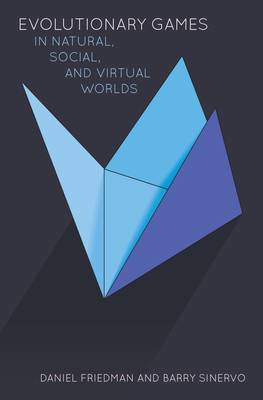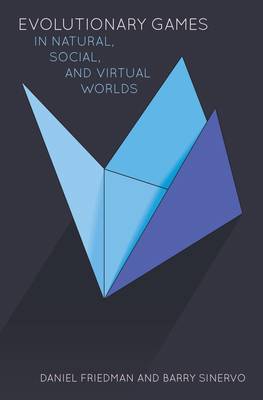
- Retrait gratuit dans votre magasin Club
- 7.000.000 titres dans notre catalogue
- Payer en toute sécurité
- Toujours un magasin près de chez vous
- Retrait gratuit dans votre magasin Club
- 7.000.0000 titres dans notre catalogue
- Payer en toute sécurité
- Toujours un magasin près de chez vous
Evolutionary Games in Natural, Social, and Virtual Worlds
Daniel Friedman, Barry Sinervo
Livre relié | Anglais
209,45 €
+ 418 points
Description
Over the last 25 years, evolutionary game theory has grown with theoretical contributions from the disciplines of mathematics, economics, computer science and biology. It is now ripe for applications. In this book, Daniel Friedman---an economist trained in mathematics---and Barry Sinervo---a biologist trained in mathematics---offer the first unified account of evolutionary game theory aimed at applied researchers. They show how to use a single set of tools to build useful models for three different worlds: the natural world studied by biologists; the social world studied by anthropologists, economists, political scientists and others; and the virtual world built by computer scientists and engineers. The first six chapters offer an accessible introduction to core concepts of evolutionary game theory. These include fitness, replicator dynamics, sexual dynamics, memes and genes, single and multiple population games, Nash equilibrium and evolutionarily stable states, noisy best response and other adaptive processes, the Price equation, and cellular automata. The material connects evolutionary game theory with classic population genetic models, and also with classical game theory. Notably, these chapters also show how to estimate payoff and choice parameters from the data. The last eight chapters present exemplary game theory applications. These include a new coevolutionary predator-prey learning model extending rock-paper-scissors; models that use human subject laboratory data to estimate learning dynamics; new approaches to plastic strategies and life cycle strategies, including estimates for male elephant seals; a comparison of machine learning techniques for preserving diversity to those seen in the natural world; analyses of congestion in traffic networks (either internet or highways) and the "price of anarchy"; environmental and trade policy analysis based on evolutionary games; the evolution of cooperation; and speciation. As an aid for instruction, a web site provides downloadable computational tools written in the R programming language, Matlab, Mathematica and Excel.
Spécifications
Parties prenantes
- Auteur(s) :
- Editeur:
Contenu
- Nombre de pages :
- 434
- Langue:
- Anglais
Caractéristiques
- EAN:
- 9780199981151
- Date de parution :
- 01-03-16
- Format:
- Livre relié
- Format numérique:
- Genaaid
- Dimensions :
- 155 mm x 236 mm
- Poids :
- 793 g

Les avis
Nous publions uniquement les avis qui respectent les conditions requises. Consultez nos conditions pour les avis.






